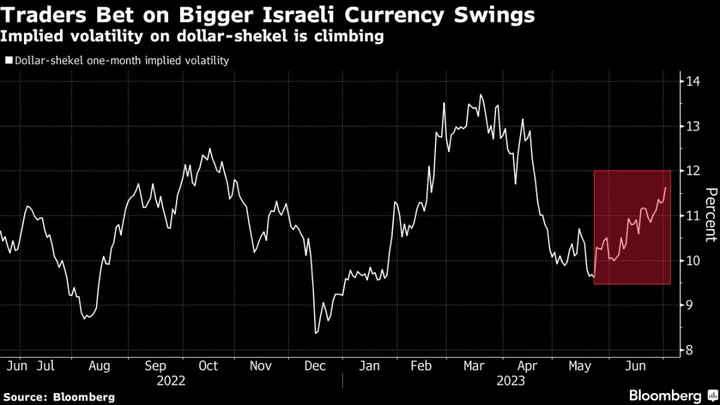Israel’s anti-government protest movement launched a series of major disruptions on Monday, including an attempt to sow chaos at the international airport, over a renewed official attempt to weaken the judiciary.
The standoff coincides with an unusually fierce Israeli military operation in the northern West Bank that killed nine Palestinians and injured several dozen, some critically. Such operations depend partly on military reservists, some of whom are stepping up their role in the protests.
Amid the tensions, Israeli stocks fell and the shekel weakened against the dollar for a ninth day, leaving it on track for the longest losing streak since September 2020.
Since January, when Prime Minister Benjamin Netanyahu’s right-wing religious coalition announced a comprehensive plan to overhaul the courts, protests have occurred at least weekly, accusing the government of seeking authoritarian powers. But demonstrations slowed after Netanyahu put the plan on hold to allow for negotiations.
The talks recently broke down and the government introduced one key element into the legislative process — removing from judges the power to void appointments or decisions as “unreasonable.” The combination of the failed talks and the revived legislation has lit up the protest movement once again.
The last “day of disruption” by demonstrators was on May 4. Now such actions are under way again. On Monday, hundreds of protesters briefly blocked a gate to the port of Haifa.
More disruptions could be ahead.
Hundreds of military reservists — medics, intelligence officers, combat soldiers and pilots — have signed letters asserting that they won’t feel obliged to show up for service if the judicial changes become law.
“In light of the fact that the government has become ‘illegitimate’ — it is not worthy of our volunteering and obedience,” read one such letter from volunteers in the vital 8200 intelligence unit.
An organization of veterans, which has taken the name “Brothers in Arms,” says it has tens of thousands of members and is planning a series of more disruptive actions in the coming weeks. It also warns that if the new law passes, they will not show up for training — although there has been a gap in the past between threat and action on such refusal.
‘Irreparable Rift’
It was the prospect of widespread dissent within the ranks of the military, combined with a growing sense of threat from Iranian-backed militias like Hamas and Hezbollah, that caused Netanyahu to pause the judicial overhaul three months ago. At the time, Defense Minister Yoav Gallant said national security was at risk.
On Monday, a group of veterans from Shin Bet, Israel’s domestic security agency that’s a key player in West Bank operations, also warned that the government’s plans to move ahead with the judicial overhaul legislation “will create an irreparable rift in Israeli society, fatally damage national strength and Israeli defense.”
All of this has occurred while Iranian-backed challenges to Israel on its borders have been growing, and the Israeli military has killed scores of Palestinian militants in the bloodiest half-year in two decades.
Those factors remain, as Monday’s assault on the Jenin refugee camp showed. But so does intense pressure from within Israel’s ruling coalition to reduce the power of the judiciary. The right considers it a bastion of secular leftists whose decisions on human and minority rights contradict the will of the majority.
Gloves Off
The presence in Netanyahu’s government of political forces long considered illegitimate because of their anti-Arab extremism has also awakened political activism among secular liberals who say they are going to take off their gloves now to fight for Israeli democracy.
“Netanyahu and his extremist partners aim to impose a dictatorship in Israel and are using tools identical to those recently wielded by the leaders of Poland and Hungary,” Shikma Bressler, a physicist and protest leader, wrote in Monday’s Haaretz newspaper. “History shows that only an uncompromising civil struggle can prevent such leaders from achieving their goal. Our efforts in the coming weeks are likely to be less pleasant.”
As markets have suffered from the uncertainty and the internal tensions, Israel’s robust technology sector has played a key role in protests against the judicial overhaul.
The movement is heavily financed by Israelis in the industry, and cabinet ministers have met with high-tech entrepreneurs to try to persuade them to stop funding the protests, telling them the judicial overhaul isn’t viable anymore.
But with the introduction of the law on reasonableness, those appeals are falling on deaf ears.
“We are all in,” said Erez Shachar of Qumra Capital, which invests in Israeli tech companies, when asked about the renewed protests. “Letters, press announcements, supporting the demonstrations, special ops - both tech and general, very similar to the activities of two months ago.”
--With assistance from Gwen Ackerman, Galit Altstein and Alisa Odenheimer.

